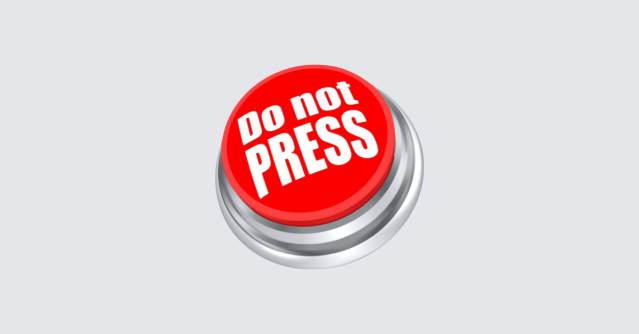There’s an much-quoted, if often inexactly remembered, exchange in The Hitchiker’s Guide to the Galaxy that goes like this:
ARTHUR: This is my idea of a spaceship!
All gleaming white, flashing lights, everything.
What happens if I press this button?
FORD: I wouldn’t...
[ARTHUR presses button]
ARTHUR: Oh!
FORD: What happened?
ARTHUR: A sign lit up saying,
"Please do not press this button again."
We’ve all been there – not in a spaceship, of course, but in front of a button that made us wonder.
And we’ve all been faced with the unexpected after-effects of pressing or clicking on one of those “she’ll be right” options.
The washing machine that was working fine but now won’t even open the door to let us extract the half-washed clothes; the computer that won’t turn on at all any more, let alone reboot; the hotel room at an unbelievably low online price that came back at $375 a night after we refreshed the page.
So spare a thought for the Air Europa crew member who pressed the wrong button, metaphorically at least, while getting ready to depart on a flight from Amsterdam to Madrid yesterday afternoon.
We don’t know what they hoped the metaphorical button was for – play a welcome message, perhaps; thank the eagerly-waiting passengers for not being selfish about the overhead locker space (we can but dream!); remind everyone who’d forgotten to buy gifts for their children about the amazingly expensive range of toys available for in-flight purchase; explain the byzantine protocol for using your oxygen mask…
…but that’s not the button they actually pressed.
Instead, someone – apparently the pilot – activated the secret alert that quietly sent off a message along the lines of:
Dear Schiphol Airport, Don't look now and give the game away, but we have a hostage situation here on board. Your earliest assistance would be greatly appreciated. Sincerely yours, The Crew.
The good news is that there wasn’t a problem and no one was threatened.
The even better news is that even though the mistake caused some disruption, with news reports saying that some parts of the airport were evacuated because of precautions that turned out to be unnecessary, there don’t seem to have been any damaging or lasting side-effects.
False alarms, obviously, are best avoided, not least because they breed complacency, but a system that can take even disastrous-sounding news in its stride without making the cure worse than the disease is to be applauded.
This isn’t the first false attack alert in recent times – in the past two years we’ve written variously about:
- An incoming missile alert in Hawaii. In this case, the blame was placed on a computer system that put the
[Send out a real alert]button – which you’d hope never to need – and the[Test the alert system]button – one that you’d hope would be used regularly and frequently – confusingly close together. Apparently, the button to[Cancel an alert]was locked down against misuse to the point that the person who was able to activate the fake alert was not trusted to cancel it. This led to a 38-minute delay in rescinding the bogus warning. - A warning in Japan saying, “North Korea Missile Alert. Take Cover.” The warning was followed five minutes later with the brief but reassuring words, “Mistake. There is no alert.”
- A hacked Nest security camera that broadcast a fake nuclear attack warning to a Californian couple. After a few minutes of panic, during which their 8-year-old son thoughtfully but ineffectively took cover under a rug, the alert parents happily realised, tellingly, that play had not stopped in the live football game on TV.
The first two fake alerts above, like the Air Europa incident, were honest mistakes, and you can imagine how they could be made even by someone with everyone’s very best interests at heart.
But the last case boggles the mind – of all the pranks that a hacker could play on a family whose home network they’d broken into, simulating a nuclear attack warning seems peculiarly and horribly heartless.
That’s one of the reasons why hacking into other people’s network is illegal even if you didn’t intend to cause trouble or to commit any further crimes.
You weren’t invited; you shouldn’t be there; it isn’t funny; and there’s too much at stake to treat any sort of computer break in as a mere prank.

